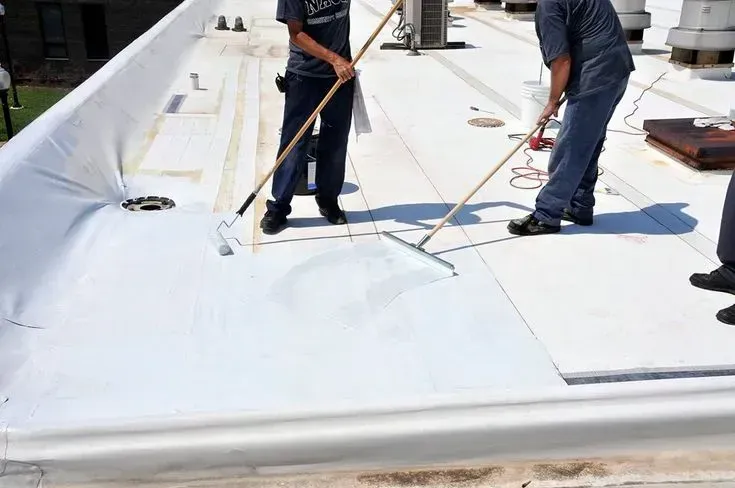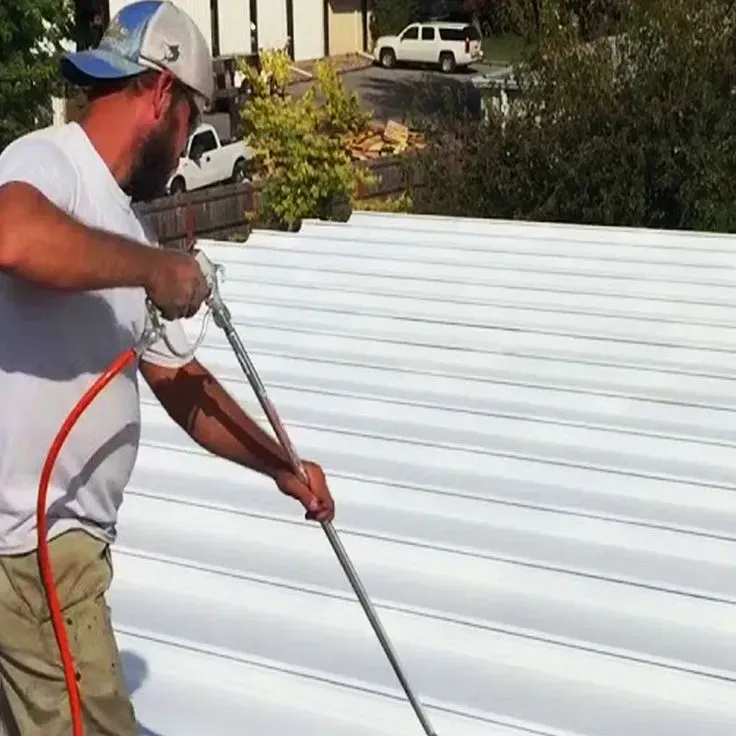In industrial and commercial environments where exposure to harsh chemicals is a constant threat, flat roofing demands specialized protection to ensure longevity and safety. Chicago Elite Commercial Flat Roofing offers expert flat roofing for installation of protective coatings for chemical resistance designed specifically to shield your roof from corrosive substances and environmental hazards. Our coatings create a robust barrier that prevents chemical damage, reduces wear, and significantly extends the roof’s lifespan, minimizing costly repairs and downtime.
We recognize that commercial buildings in Chicago face unique challenges, including exposure to industrial chemicals, extreme weather, and heavy foot traffic. That’s why our team uses only premium-grade chemical-resistant coatings tailored to withstand these conditions. These coatings not only protect against chemical spills and airborne contaminants but also guard against moisture infiltration and UV degradation, preserving the roof’s structural integrity.
By choosing Chicago Elite Commercial Flat Roofing, you’re partnering with professionals who understand the critical role of protective coatings in maintaining a safe, durable roofing system. Our comprehensive service includes precise installation and ongoing maintenance, ensuring your flat roof remains fully protected against chemical exposure and other environmental stresses. Trust us to deliver flat roofing solutions that meet the highest standards of performance and reliability for your commercial property.

Flat Roofing for Installation of Protective Coatings for Chemical Resistance Services by Chicago Elite Commercial Flat Roofing
Benefits of Protective Coatings for Flat Roofs
Protective coatings provide specific advantages, particularly for commercial flat roofs exposed to harsh chemical environments. These coatings improve durability, resist chemical damage, and contribute to energy savings. Understanding these benefits helps us make informed decisions about maintenance and roof protection.
Enhanced Chemical Resistance Properties
Flat roofs exposed to chemicals need robust protection. Protective coatings act as a barrier, preventing harmful substances from penetrating the roofing materials. This reduces risks of corrosion and material degradation caused by acids, oils, solvents, and other industrial chemicals.
Our choice of coatings includes specialized formulations designed to withstand various chemical exposures. These coatings maintain their integrity even in challenging environments, reducing the frequency of repairs and potential roof failures. They also help maintain structural safety, which is crucial for industrial and commercial facilities.

Extended Roof Lifespan
Applying protective coatings significantly extends a roof's useful life. Coatings seal small cracks and voids, limiting water intrusion and preventing leaks that lead to costly damage. By blocking moisture and resisting weather-related wear, they preserve the roof’s base materials.
In addition to water resistance, coatings also protect against UV radiation and temperature fluctuations. These factors cause roof materials to expand, contract, and weaken over time. A properly applied protective coating reduces this stress, keeping the roof stable and secure for years longer.
Energy Efficiency Improvements
Protective coatings can improve energy efficiency by reflecting sunlight and lowering heat absorption. White or light-colored coatings are particularly effective at reflecting UV rays, reducing roof surface temperatures in warm climates.
Lower roof temperatures translate to less heat transfer into the building. This reduces cooling system demand, cutting energy costs. Our coatings also help maintain consistent interior temperatures, contributing to a more comfortable and cost-effective environment year-round.
Chicago Elite Commercial Flat Roofing’s Installation Process
Our process ensures that every flat roof receives thorough attention, starting with an evaluation, followed by precise surface preparation, and ending with expert application of protective coatings. These steps are designed to maximize chemical resistance and durability.
Comprehensive Roof Evaluation
We begin by conducting a detailed inspection of the flat roof to identify damage, moisture intrusion, and structural weaknesses. This step helps us determine the current condition and specific needs of the roof.
During the evaluation, we check for cracks, blisters, and areas prone to leaks. We also assess the existing roofing materials to decide whether repairs or full replacement are necessary before coating installation.
Our team documents all findings with photos and notes, which enables us to create a tailored plan focused on ensuring the protective coating will adhere properly and perform effectively against chemical exposure.
Surface Preparation Methods
Proper surface preparation is essential for coating adhesion and long-term performance. We remove dirt, debris, and any loose materials through power washing or mechanical cleaning.
If repairs are required, such as patching cracks or sealing joints, we complete those before applying the coating. We also ensure the surface is completely dry to avoid trapping moisture beneath the protective layer.
In some cases, we apply primers to enhance bonding. The goal is to provide a clean, stable base that supports the coating’s chemical resistance and weatherproofing qualities.
Application Techniques for Protective Coatings
We use liquid-applied coatings that are sprayed, rolled, or brushed onto the prepared roof surface. The choice depends on the coating type and roof condition.
Our team applies coatings in multiple layers to create a uniform, continuous barrier against chemicals, UV rays, and water damage. Thickness and coverage are monitored closely to meet manufacturer specifications.
We also focus on critical areas like seams, edges, and penetrations to ensure complete protection. Once applied, the coating cures to form a flexible yet durable surface tailored for commercial environments exposed to harsh chemicals.
Choosing the Right Protective Coating for Chemical Resistance
Selecting an appropriate chemical-resistant coating requires understanding the types available and knowing the factors that affect their performance in different environments. This ensures the coating can withstand exposure to specific chemicals while maintaining the roof's integrity and longevity.

Types of Chemical-Resistant Coatings
There are several coatings designed for chemical resistance, each suited to different conditions. Novolac epoxy coatings offer excellent chemical protection and durability, making them suitable for industrial rooftops exposed to harsh substances.
Silicone coatings resist moisture and UV damage and are effective in environments with high humidity, but they offer moderate chemical protection.
Urethane-silicone (Ure-A-Sil) systems combine chemical resistance with flexibility and weatherproofing, ideal for varied climates and chemical exposure.
We also consider polyurethane coatings that provide strong abrasion and chemical resistance, particularly for spills and stains. Choosing the right type depends on the mix of chemicals and environmental stresses the roof faces.
Advanced Waterproofing Systems
Factors Influencing Coating Selection
The nature of the chemicals involved is the primary concern. Acids, alkalis, oils, or solvents each require coatings with specific resistance properties.
We assess the roof's exposure duration to chemicals—constant contact demands more robust protection than occasional exposure.
Environmental factors such as temperature fluctuations, UV exposure, and moisture levels also impact coating durability and must align with the coating’s properties.
Application conditions and roof material compatibility play roles as well; proper adhesion and cure times affect long-term performance.
Understanding these factors helps us recommend coatings that balance protection, cost, and maintenance needs effectively.
Frequently Asked Questions
At Chicago Elite Commercial Flat Roofing, we specialize in applying high-performance protective coatings that stand up to harsh chemicals, spills and industrial exposure. Below are the top questions facility managers and building owners ask about flat-roof coatings for chemical resistance in Chicago.
What coating types offer the best chemical resistance for flat roofs in Chicago?
We recommend plural-component epoxies and high-solids polyurethanes formulated for industrial environments. These coatings resist oils, acids and alkalis commonly found in Chicago’s manufacturing and food-processing facilities.
How long will a chemical-resistant coating last under Chicago’s freeze-thaw cycles?
Our commercial-grade coatings carry a 10 – 15 year lifespan in Chicago’s climate. They retain adhesion and flexibility through temperature swings between –20 °F winters and 100 °F summers.
What’s the typical cost per square foot for installing chemical-resistant coatings on a flat roof in Chicago IL?
Most projects run between $3.50 and $6.50 per ft², depending on surface prep, coating system chosen and roof pitch. We provide a detailed, line-item estimate after an on-site evaluation.
Can you coat an existing roof membrane, or is this only for new builds?
We routinely refurbish existing EPDM, TPO and built-up roofs with chemical-resistant topcoats—no tear-off required when substrate integrity is sound. This minimizes disruption and waste.
Do you back your chemical-resistant coatings with a warranty?
Absolutely. We offer up to a 15-year manufacturer’s warranty plus our own workmanship guarantee. That covers material failure and leaks due to coating defects, so you get peace of mind for years.
